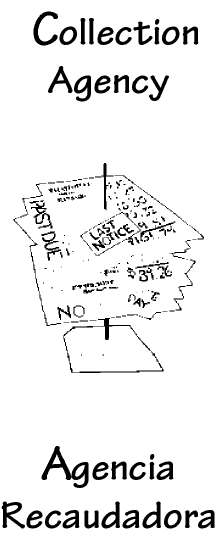Now Playing: Collection Agencies
Topic: Business & Labor
They don't hesitate to charge and collect late fee's but that doesn't stop the sharking and bloodying of family financial waters. It's hard to sympathize with this segment of corporate capitalism which seems somehow to be a system of creating profits from within its own sphere by consuming the consumers down to bare bones and then crunching up the bones.

Image from www.consumer-action.org
[Excerpts] from
Consumer complaints against the folks who chase after people with unpaid bills are on the rise as creditors try to recover delinquent accounts."
When David Rhodes got a letter at his home demanding $351.89 for an old cell phone bill, he knew something was amiss.
Not only was the letter addressed to Janha Rhodes, but David Rhodes never even had an account with Sprint, although an agency named Collectech claimed he had.
“I called and I said, ‘Do you have a Social Security number? Do you have anything? Do you even have a signature?’ They had nothing,” recalled Rhodes, 60, who lives in Manhattan. “I was annoyed. Well, angry.”
Calls and letters from debt collectors are about as welcome as cockroaches, and they’re appreciated even less when the tab was run up by someone else.
Beyond chasing after people who haven’t paid their bills – for reasons understandable, or not – collection agencies often pursue the wrong person and sometimes play downright rough, critics of the industry charge.
In Washington, complaints against debt collectors rate third among all complaints to the state attorney general’s office.
...
Creditors, such as credit card companies and retailers, increasingly sell off their delinquent debt to companies that often buy it for just pennies on the dollar, said Jonathan Mintz, the New York City consumer department’s commissioner.
These buyers then either try to collect the debt themselves or farm out the work to other agencies.
This selling and reselling sometimes leaves collectors with bad information. It also prompts some collectors to get more aggressive because “they’re no longer protecting the reputation of the original business,” Mintz said.
...
Consumers are certainly not blameless. Even if collectors are targeting the wrong person, the debt they’re after is real. And delinquent debt is on the rise.
Outstanding consumer, government and business debt grew 7.5 percent annually between 2000 and 2004 to about $24 trillion, according to mergers and acquisitions advisory firm Kaulkin Ginsberg.
That, along with tougher bankruptcy laws, has helped create a boom in the collections industry.
But there are rules. Calling more than twice a week, or before 8 a.m. or after 9 p.m., advertising a debt, and attempting to seize wages or assets without legal authorization are all forbidden.
The rules for debt collectors
The Washington State Office of the Attorney General provides tips to help consumers navigate debt collection and deal with false claims from collection agencies.
If you fall behind on your credit card or loan payments, you may be contacted by a debt collector: Collection agencies are regulated by the federal Fair Debt Collection Practices Act and Washington law. These laws require that debt collectors treat you fairly, and limit how often they may contact you.
When a debt collector may call you: Collectors may contact you in person, by mail, telephone, telegram or fax. However, they may not call you between 9 p.m. and 8 a.m. A collection agency may not call or write to you more than three times a week. One of those calls may be made to your workplace unless a collector knows that your employer disapproves of such calls.
When a debt collector may contact people you know: If you have an attorney, collectors are prohibited from contacting anyone other than your attorney. If you don’t have an attorney, a collector may contact other people, but only to find out where you live, what your phone number is, and where you work. The debt collector may not tell those people that you owe money and, in most cases, may only contact your employer or others once.
You can stop a debt collector from contacting you by sending a written request: The collector may not contact you again except to say there will be no further contact or to notify you that the debt collector or your creditor intends to file a lawsuit or take another specific action. If you don’t believe you owe money, you should notify the collector in writing. A collector may contact you after receiving your letter, but may not pursue the debt if you are able to prove that it has been paid or that the debt is not yours.
Other restrictions: Debt collectors may not require you to write a post-dated check, harass you, use false names, provide fake credentials, publish lists of people who owe money, make collect calls, raise interest rates or add additional charges not allowed by law or threaten to have you jailed. They also may not take your possessions or garnish your wages without a court judgment. An exception allows a garnishment up to 10 percent of the debtor’s pay if a federally guaranteed student loan is in default.
To report a debt collector for a violation: If you believe a debt collector has violated the law, you may file a complaint with the Attorney General’s Office online at www.atg.wa.gov or call 800-551-4636 to request a complaint form by mail. You have the right to sue a collector within one year from the date the law was violated. If you win, you may recover money for the damages you suffered plus an additional amount up to $1,000. Alternatively, you may join a class-action lawsuit against a debt collector, if one has been filed.
C.R. Roberts, The News Tribune







